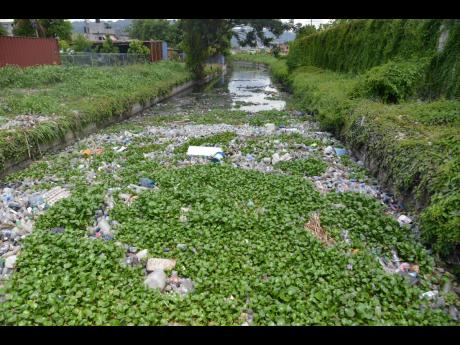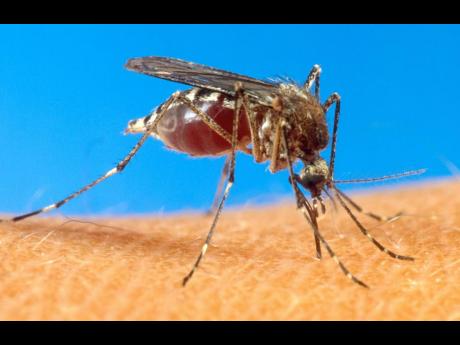Christopher Tufton | The climate, dengue dilemma
From extreme hurricanes and droughts to rising sea levels and increasing temperatures, climate-change risks and threats abound, and public health is not immune. The current dengue outbreak impacting Jamaica, as elsewhere in the region of the Americas, brings this into sharp focus.
The dengue virus, the World Health Organisation tells us, is the arbovirus that causes the greatest number of dengue fever cases in the region, with epidemics occurring every three to five years. The virus requires a mosquito vector, most notably the Aedes egypti, which is well adapted to our tropical region, and the behaviour of the mosquito is influenced by climatic conditions. It, therefore, has an extrinsic incubation period that may be shortened by warmer weather with respect to transmission among human beings.
With the reality of a changing climate, dengue is, therefore, anticipated to become an even greater challenge. This is borne out by the work of Professor Anthony Chen – Jamaican physicist and Nobel Peace Prize winner – who, in 2006, published his study The Threat of Dengue Fever in the Caribbean: Impacts and Adaptation.
With temperature the main component for a potential dengue epidemic, the study revealed that “a temperature increase of two degrees Celsius from 30 degrees Celsius to 32 degrees Celsius can shorten the extrinsic incubation period of the viruses from 12 to 7 days (for dengue type 2) and decreasing the incubation period by five days can lead to a threefold higher transmission rate of dengue”.
It is to be noted that rising global temperatures is one of the main features of climate change.
This is in addition to extreme weather events, to which Caribbean small island developing states (SIDS) are especially vulnerable; rising sea levels and associated compromised freshwater and food security; as well as nature loss, among other risks and threats.
Professor Chen’s research also revealed that there is an increase in dengue cases, “with climatic variability associated with El Niño” – and earlier this year, scientists cautioned that we were in an El Niño year, which sees us prone to drying during traditional rainy periods.
CONDITIONS RIPE
Conditions have, therefore, been ripe for a dengue outbreak, given what we already know of the disease but also given prevailing climate-change realities. This and other infectious diseases generally have worse outcomes in persons with non-communicable diseases. It means that we must address climate change head on, recognising the risks to our survival while redoubling efforts to enable the resilience of, in particular, Caribbean SIDS.
To get there, SIDS have and continue to call on the world’s major polluters to significantly reduce their greenhouse gas emissions, towards the attainment of the 1.5 degrees temperature goal, as provided for in the Paris Agreement and which is intended to keep the planet safe.
It is also necessary, as reflected in the Alliance of Small Island States Leaders Declaration 2023, that we “collectively ensure a global accelerated just transition to more sustainable energy sources and systems toward a net zero world by 2050, through promoting the development of low-emission technologies, and removing barriers for the transboundary flows of clean and renewable energy”.
It requires, too, significantly enhanced adaptation interventions, attention to loss and damage, and the mobilisation of global financing that is readily accessible to Caribbean SIDS. The fact is that SIDS require special consideration, given our small size, high debt burden, and the extent of our vulnerability to climate impacts.
If we can succeed in these efforts, then we can apply the brakes to the climate crisis while shoring up our capacity to respond and to overcome.
HEALTH-SYSTEM STRENGTHENING
In public health, we are seized of the urgency to innovate, including through the adoption of digital solutions, given the health system’s vulnerability to climate risks and threats and the implications for the delivery of health services to our population.
Much of these innovations are embodied, at this time, in Jamaica’s Health Systems Strengthening Programme for the Prevention and Care Management of Non-communicable Diseases.
The principal goal of the programme – financed through the Inter-American Development Bank, the European Union, and the Government of Jamaica – is to increase the capacity of our health facilities to provide comprehensive health-information management and data -exchange systems for health promotion, disease prevention and treatment – all within an Integrated Health Services Delivery Network.
The Chronic Care Model, a comprehensive system for organising chronic disease care within that Network, is also being introduced to support coordination between and among health centres and hospitals and other facilities that form a part of the Network. The expected outcomes are enhanced patient-centred care, improved patient self-management, more satisfied providers, and lower healthcare costs.
Our efforts also extend to the Smart Health Facilities Programme that sustains the interventions from the Smart Health Care Facilities in the Caribbean project that was implemented with the support of the Pan-American Health Organisation and with financing from the UK Foreign and Commonwealth Development Office.
The Smart Health Facilities concept marries structural and operational safety with environmentally sound technologies and interventions. In Jamaica, it has seen the emergence of 15 retrofitted climate-smart and disaster-resilient health facilities and the testing of the Smart Health Facilities Tool Kit, including a Smart Health Facilities Maintenance Programme.
The tool kit has four assessment tools, including the Hospital Safety Index (HSI), a safety ranking of the degree of protection for occupants; and the Green Checklist for Environmental Friendliness, which provides a relative ranking for environmental soundness.
It also includes the Baseline Assessment Tool, which accounts for, among other things, baseline information to determine the carbon footprint, and the evaluation of property condition to determine a structure’s suitability for retrofitting as well as the Retrofitting Economic Support Tool.
Further, 151 facilities have been assessed under the project while various categories of workers have been trained in the HSI and Green Checklist Assessment and have also been exposed to conservation and contingency training as well as training in Smart Maintenance Standard Operating Procedures.
All of these are necessary actions if we are to create and sustain resilience in public health – and for which we need the people of Jamaica’s buy-in and support.
DENGUE SOLUTIONS
Recognising the scale of the threat of dengue, for example, it is necessary that members of the public do all that they can to protect their health. It means destroying or treating potential mosquito breeding sites, including water storage containers and especially drums; emptying dish drainers and plant saucers; as well as keeping our surroundings free of solid waste. It also means wearing protective clothing and using a DEET-containing mosquito repellent as well as knowing how to safely care for ourselves if we become infected with the dengue virus.
As we consider the retrofitting that has taken place through our Smart Health Facilities intervention, we encourage users to take care of the facilities, preserving the work that has been done to make those facilities climate smart.
As for our efforts to boost health-system resilience through the HSSP, we urge patience and cooperation to get the work done as we improve the capacity for low carbon operations to respond to emergencies and also to recover from disasters.
Climate change is a clear and present danger to public health, but we have it in us to meet the challenge and to overcome – if we recognise and accept the risks and threats and then work collaboratively to overcome them.
-Dr Christopher Tufton is Jamaica’s minister of health and wellness and member of parliament for St Catherine West Central. Send feedback to cctufton@gmail.com or columns@gleanerjm.com.



